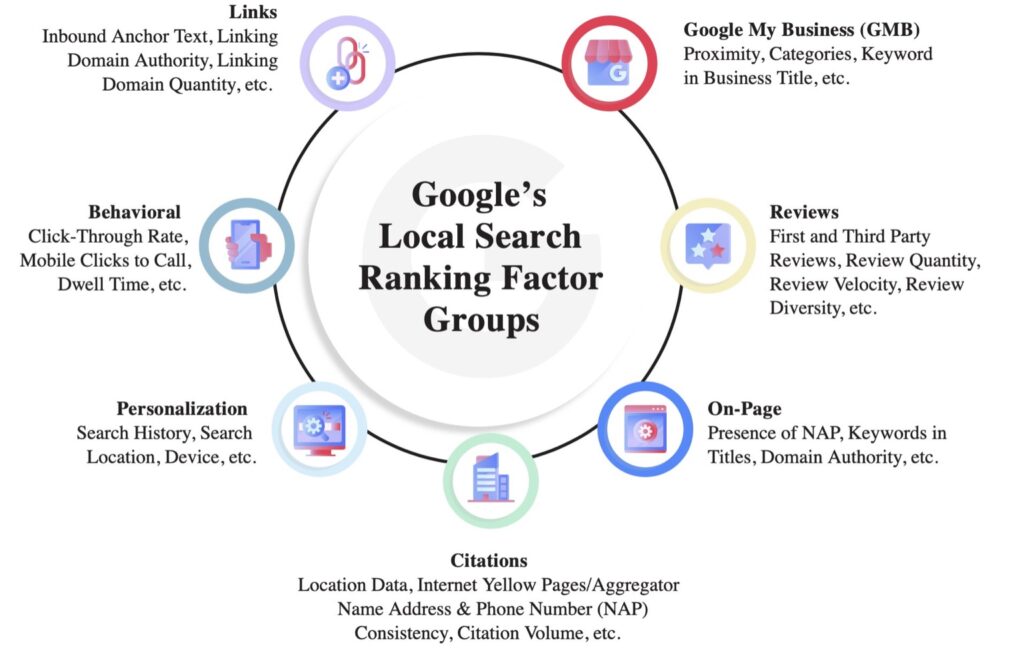
Generative Engine Optimization (GEO)
Generative Engine Optimization (GEO): The Future of Search and How It Differs from SEO As digital marketing continues to evolve, search is undergoing a radical
AI DIGITAL MARKETING AGENCY

Your Google My Business (GMB) profile is the cornerstone of your local search presence. Google uses the information in your GMB listing to determine relevance and proximity to searchers. Optimizing your GMB listing with accurate information, relevant categories, and strategic keywords can significantly boost your visibility. Ensure your business name, address, and phone number (NAP) are correct and match your website. Regularly update your GMB profile with new photos, posts, and customer Q&A.
Customer reviews are a critical factor in local search rankings. Google looks at both the quantity and quality of reviews. Positive reviews not only improve your rankings but also build trust with potential customers. Encourage satisfied customers to leave positive reviews on your GMB profile and other review platforms. Respond to all reviews, showing that you value customer feedback and engagement, which can further enhance your reputation.
To improve your Google My Business (GBP) listing and boost your local SEO ranking, follow these essential steps:
1. Complete and Accurate Information: Ensure your GBP listing is filled out completely with up-to-date information. This includes your business name, address, phone number (NAP), website, hours of operation, and business category. Accurate and detailed information helps Google understand your business better and improves your chances of appearing in relevant local searches.
2. Regular Updates: Keep your GBP listing current by updating it regularly. If you have changes in your business hours, address, or contact information, make sure to reflect these changes on your GBP profile promptly. Regular updates signal to Google that your business is active and engaged.
3. High-Quality Photos and Videos: Upload high-quality photos and videos that showcase your products, services, and the interior and exterior of your business. Visual content attracts more views and engagement, making your listing more appealing to potential customers and helping improve your ranking.
4. Customer Reviews: Encourage your customers to leave positive reviews on your GBP listing. Responding to reviews, both positive and negative, shows that you value customer feedback and are committed to providing excellent service. Positive reviews can significantly enhance your local SEO ranking.
5. Detailed Business Description: Write a detailed and compelling business description that includes relevant keywords. Your description should clearly explain what your business offers, highlighting unique selling points and services. This helps Google match your listing with relevant local search queries.
6. Regular Posts: Utilize the posts feature on GBP to share updates, promotions, events, and news about your business. Regularly posting relevant content keeps your audience informed and engaged, and signals to Google that your listing is active and relevant.
7. Accurate Map Location: Ensure the pin on the map accurately represents your business location. An incorrect location can lead to customer confusion and negatively impact your local SEO ranking.
To manage online reviews effectively and positively impact your local SEO, follow these best practices:
1. Encourage Positive Reviews: Actively encourage satisfied customers to leave positive reviews on your Google My Business (GBP) listing. After a successful transaction or service, politely ask your customers to share their experiences. The more positive reviews you have, the better your chances of improving your local SEO ranking.
2. Respond to Reviews Promptly: Engage with your customers by responding to their reviews promptly and professionally. Thank customers for positive feedback, and address any concerns or issues raised in negative reviews. This shows that you value customer input and are committed to providing excellent service.
3. Maintain a Professional Tone: Always respond to reviews with a professional and courteous tone. Avoid getting defensive or argumentative, even if the review is negative. A calm and constructive response can help mitigate the impact of a negative review and demonstrate your commitment to customer satisfaction.
4. Address Negative Reviews Constructively: When responding to negative reviews, acknowledge the customer’s experience and offer a solution or an apology if necessary. This not only helps in resolving the issue but also shows potential customers that you are attentive and proactive in addressing problems.
5. Highlight Positive Reviews: Share positive reviews on your website, social media, and other marketing channels. Highlighting customer testimonials can enhance your business’s credibility and attract more potential customers.
6. Monitor Your Reviews Regularly: Keep a close eye on your GBP listing and other review platforms to stay updated on new reviews. Regular monitoring allows you to respond quickly and manage your online reputation effectively.
7. Incentivize Feedback: Consider implementing a feedback system that incentivizes customers to leave reviews. While you should avoid offering rewards in exchange for positive reviews (as it violates Google’s policies), you can encourage feedback by highlighting its importance to your business.
8. Ensure Authenticity: Make sure all reviews are genuine and come from actual customers. Fake reviews can harm your credibility and violate Google’s guidelines, leading to penalties that can negatively impact your local SEO ranking.

Generative Engine Optimization (GEO): The Future of Search and How It Differs from SEO As digital marketing continues to evolve, search is undergoing a radical

Updated Best Practices for Building a Brand Presence on YouTube (2025) YouTube continues to be a dominant platform for video content, offering businesses unparalleled opportunities

Best Practices for Building a Brand Presence on Instagram (2025) Instagram continues to dominate as a platform for visual storytelling, brand development, and audience engagement.

10 Proven Social Media Strategies to Dominate in 2025 In the dynamic landscape of 2025, mastering social media requires a strategic approach tailored to evolving

Updated Best Practices for Building a Brand Presence on X (2025) X (formerly Twitter) continues to be a powerful platform for real-time conversations, customer engagement,

Updated Best Practices for Building a Brand Presence on LinkedIn (2025) LinkedIn remains the premier platform for professional networking and B2B marketing, offering businesses unparalleled